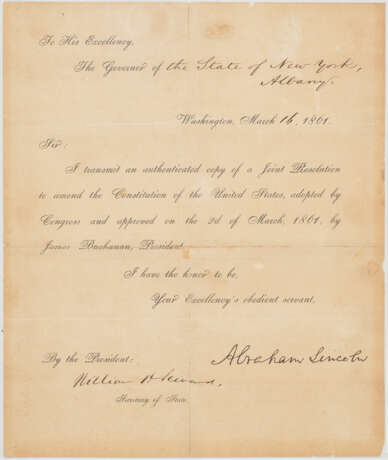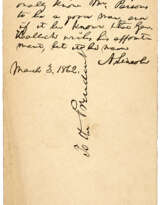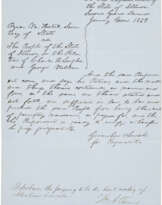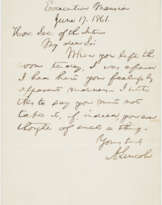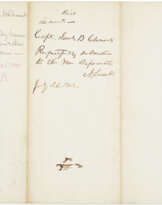ID 1362403
Лот 667 | Forwarding a copy of the Corwin Amendment
Оценочная стоимость
$ 100 000 – 150 000
Abraham Lincoln, 16 March 1861
LINCOLN, Abraham. Document signed ("Abraham Lincoln") as President to [Edwin D. Morgan,] the Governor of New York, Washington, 16 March 1861.
One page, 224 x 189mm (weak and partly split folds reinforced on verso, moderate toning.) Professionally encapsulated. Matted and framed with a portrait.
Lincoln forwards a proposed amendment to the Constitution protecting slavery in an effort to stave off civil war. Lincoln's official transmittal to the Governor of New York of the proposed (and abortive) Thirteenth Amendment to the Constitution—popularly known as the Corwin Amendment. It reads in full: "I transmit an authenticated copy [not included] of a Joint Resolution to amend the Constitution of the United States, adopted by Congress and approved on the 2d of March 1861, by James Buchanan, President." The document bears the counter-signature of Secretary of State William H. Seward. The resolution states that: "No amendment shall be made to the Constitution which will authorize or give to Congress the power to abolish or interfere, within any State, with the domestic institutions thereof, including that of persons held to labor or service, by the laws of said State" ("domestic institutions," of course, being a euphemism for slavery).
This constitutes one of the most concrete of the flurry of measures hurriedly floated in the long, crisis-ridden interregnum between Lincoln's election in November 1860 and the firing on Fort Sumter in April 1861. When the secession stampede began in the deep South, the lame duck President James Buchanan deplored it but stood impotent while one state after another seceded and seized Federal forts and arsenals. He believed the Chief Executive had no Constitutional powers to act and lamely urged Northerners to stop their anti-slavery agitation and work with Southerners to fashion some kind of compromise bill or Constitutional amendment.
Given Buchanan's impotence (for examples see lots 665 and 666), many members of Congress realized they had to act to avoid a bloody civil war. There were so many compromises proposed that a special Senate Committee of 13 and a House Committee of 33 were formed to sort through them all. In addition, several states sent delegates to a Peace Conference in Washington on 4 February. Out of all this emerged Senator John Crittenden's proposal of a cluster of Constitutional amendments that would have among other things extended the Missouri Compromise line to the Pacific. Lincoln would have accepted nearly all the ancillary parts of the Crittenden package: It did not greatly matter to him whether or not slavery was banned in Federal forts in the South or in the District of Columbia, and he was even in favor of strictly enforcing the Fugitive Slave Law. But he was adamant to prevent the expansion of slavery into new territories. He sent word to stand firm against it. "Entertain no proposition for a compromise in regard to the extension of slavery...The tug has to come, & better now, than any time hereafter" (Donald, Lincoln, 270).
Lincoln realized that Crittenden's proposals were just holding actions. None of the compromise measures got to the root of the problem, which was (as he saw it) the Southern desire to win government sanction for the expansion of slavery. To give in would be knuckling under to slaveholders' extortion, putting the U.S. on "the high road to a slave empire...If we surrender it is the end of us. They will repeat the experiment upon us ad libitum. A year will not pass, till we shall have to take Cuba as a condition upon which they will stay in the Union" (McPherson, Battle Cry, 253). The same year that he spoke those words, Lincoln transmitted to the States another--and this time successful—Thirteenth Amendment to the Constitution, banning the "domestic institution" of human slavery forever.
Extremely rare. Only two other examples of this transmittal letter have appeared at auction, one to the Governor of California (Harry J. Sonneborn, sale Sotheby, Parke-Bernet, 11 June 1974, lot 298), and another to the Governor of New Hampshire that sold in these rooms in 2004 (16 December, lot 412, $95,600).
| Автор: | Авраам Линкольн (1809 - 1865) |
|---|---|
| Категория: | Сервизы |
| Категория аукционного дома: | Письма, документы и рукописи, Книги и рукописи |
| Автор: | Авраам Линкольн (1809 - 1865) |
|---|---|
| Категория: | Сервизы |
| Категория аукционного дома: | Письма, документы и рукописи, Книги и рукописи |
| Адрес торгов |
CHRISTIE'S 20 Rockefeller Plaza 10020 New York США | ||||||||||||||
|---|---|---|---|---|---|---|---|---|---|---|---|---|---|---|---|
| Предосмотр |
| ||||||||||||||
| Телефон | +1 212 636 2000 | ||||||||||||||
| Факс | +1 212 636 4930 | ||||||||||||||
| Условия использования | Условия использования | ||||||||||||||
| Транспортировка |
Почтовая служба Курьерская служба Самовывоз | ||||||||||||||
| Способы оплаты |
Банковский перевод | ||||||||||||||
| Часы работы | Часы работы
|
